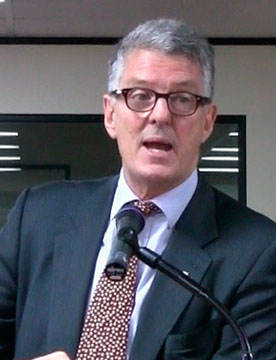
CHRISTIANS have pretty broad shoulders. Well, we need them really, when you consider all the bad stuff that keeps popping up about sexual abuse and homophobia and fundamentalists.
In most public arenas, Christians accept the chastisement and even vitriol heaped upon us for the alleged sins of our forbears and the outrageous behaviour of anyone anywhere purporting to be a follower of Jesus Christ.
As our power and influence wane, such chastisement comes to be seen as appropriate.
So the construct and the tone of the recent Brisbane Writers Festival session on Religion: the next chapter would not have come as a surprise to most attendees.
The topic attracted a crowd of several hundred, and if the essence of good debate is bringing together articulate speakers with divergent views, then the event ought to have been a cracker, especially when fuelled by an unfolding public controversy about sex.
Editor of the ABC Religion and Ethics online portal Scott Stephens was teamed with the former Bishop of Edinburgh Richard Holloway and writer David Marr at the September 7 event, facilitated by Paul Barclay, presenter of ABC Radio National's Big Ideas.
Debate was precipitated by Paul Barclay reading a quote from a newspaper report about remarks by Jim Wallace from the Australian Christian Lobby (ACL), apparently comparing the health risks of homosexuality with the risks of smoking.
This set the tenor for a discussion which relegated Christendom across history and culture as worthy of the opprobrium reserved for relics of unjust regimes.
The fact that Wallace and the ACL do not speak on behalf of any Christian denomination, and represent a minority of conservative Christians at best, was considered irrelevant.
The equally inconvenient truth that most Christians are well-educated, compassionate and tolerant citizens concerned about social justice and involved in supporting their local communities was dismissed.
Anti-slavery, women's suffrage, anti-war campaigns, Indigenous rights and environmental crusading, to name a few of the world-changing social movements with strong connections to Christian faith, were as chaff in the winds of public disapproval.
David Marr, described as a "revered social commentator" was invited onto the panel to make outrageous generalisations and rude remarks, and he did not disappoint.
The former Bishop of Edinburgh, Richard Holloway, who took the Anglican dollar for most of his professional life and now makes a living describing how dreadful and bigoted everyone was, was also keen to add his tuppence worth.
Scott Stephens, an articulate defender of the faith, made several vain attempts to call the other speakers to account for such outrageous comments as "the church hates gays" and "Christianity reflects "bronze-age ethics".
But once the debate had been subsumed by personal agendas, such as publicising the various new publications by Marr and Holloway, there was no chance that an intelligent debate about the future of religion would be allowed to happen.
Apart from a lost opportunity to bring together fine minds in respectful debate on a topic which is deeply relevant to society, this rather tiresome spectacle reflects a worrying trend.
Christians ought to be concerned that a small conservative lobby group continues to claim the public space as the Christian voice.
We should be disturbed by the fact that it is not longer possible to have intellectual, articulate conversations about faith and ethics because some subjects are virtually off-limits, while some viewpoints claim the moral high ground and are allowed to dominate the agenda of any discussion.
And we should be uneasy about the ready assumption by media commentators that the Christian viewpoint reflects bigotry and hatred.
Sure, we have broad shoulders. But this is one burden that we shouldn't have to carry.
Photo : David Marr. Photo courtesy of flickr.com/photos/mosmanlibrary/6968665774/sizes/l/in/photostream/
 JourneyOnline
JourneyOnline






